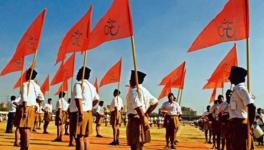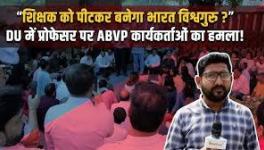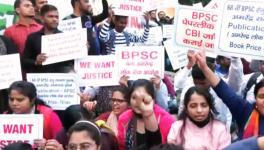JNU VC Surpasses himself: "Appeal" to Students Says Hunger Strike "Unlawful", Bordering on "Unconstitutional"
The university authorities who are solely accountable for the escalation in the present situation and the threat not just to the academic health of the JNU, but to the very lives of its students.
The JNU[1] Vice Chancellor, professor Jagadesh Kumar’s written “appeal” to the students who are on hunger strike since April 27, 2016 has surpassed even his own amazingly low standards of university governance that must respect the time-honored principle of autonomy.
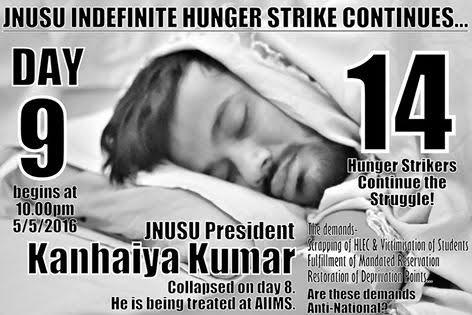
On a minor issue of `indiscipline’ he brought police onto the campus, allowed the Students Union President[2] and other student leaders to be arrested on charges of `sedition’ for slogans allegedly raised at a meeting and finally set up a `kangaroo court’ of a High Level Enquiry Committee (HLEC) which dubbed the students “anti-national” on unspecified charges and then `punished’ them without a hearing with rustication, a ban on entry into the campus for five years, and fines of up to Rs. 20,000!!
Understandably not only the JNUSU but even the JNUTA[3] rejected outright both the HLEC[4] and its report. 20 students, including the JNUSU President Kanhaiya Kumar and Secretary Rama Naga, went on an indefinite hunger fast demanding the immediate withdrawal of the `punishment’and scrapping of the illegal committee and its enquiry. Days into the hunger strike, with the health of most of the students rapidly deteriorating in Delhi’s heat-wave conditions with temperatures rising to 45 degrees, the VC came with his infamous “appeal”.
"Hunger strike” Jagadesh Kumar admonished, “is an unlawful activity and a harmful method of protest that adversely affects the health and career of the students... The administration urges the students to use constitutional means to put forth their demands, if any.”
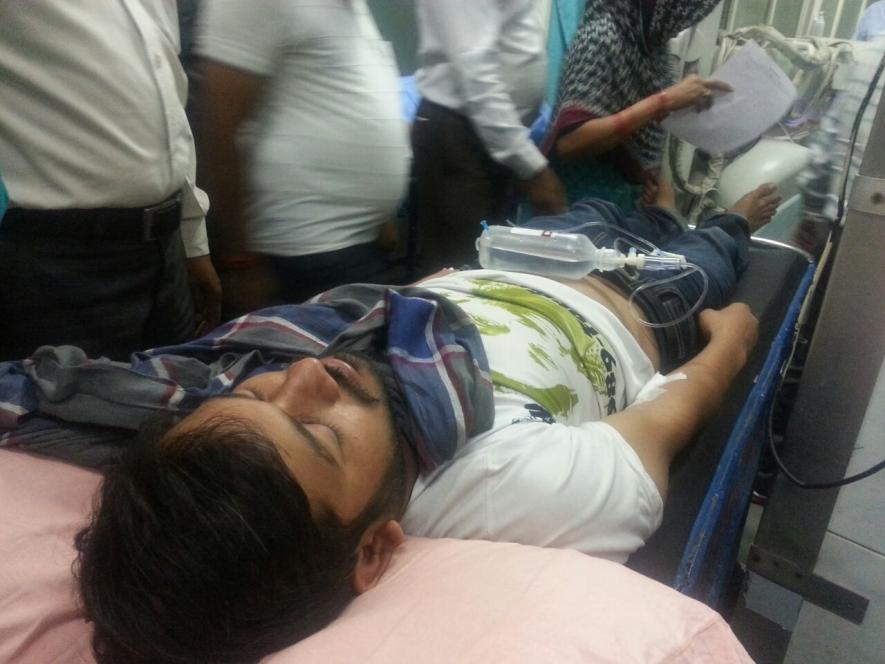
Kanhaiya Kumar being taken to hospital
Does the VC not know that in India for over a hundred years the hunger fast has been a moral statement against injustice; that it has been a major weapon of the Gandhian political strategy of satyagraha that not only played a dominant role in India’s freedom struggle but also influenced the thinking of leaders struggling against apartheid in South Africa and the civil rights movement against racism in the USA? Has he never heard of the courageous fasts unto death in 1981 of imprisoned Irish rebels opposing the injustice of British rule; of Myanmar’s Buddhist monks against British colonial rule in 1929 and against the military junta in 2007 when they marched with overturned begging bowls effectively ex-communicating the military rulers by refusing to accept alms from them or their families?
Perhaps Jagadesh Kumar does not know all this, for he belongs to an entirely different `tradition’, one which has never been inspired by the demand for freedom. Instead it has been stimulated by grandiose notions of State supremacy and the submission of the people to brute power. The supporters of Mussolini’s Italy and Hitler’s Germany, the glowing models of Nationalism for the Rashtriya Swayamsewak Sangh (RSS), never boasted of a single moral statement against injustice because obedience to the State exhausted in entirety the concepts of both law and morality.
As always with organisations like the RSS one is forced to move from the sublime to the ludicrous! So a hunger fast is a “harmful method of protest” because it “adversely affects the health and career of the students”! Of course the veiled threat underlying this apparent absurdity is that under the present regime no opposition will be tolerated so, if you know what’s profitable for you, be submissive.
The right to protest by imposing suffering on oneself in order to expose the regime’s insensitivity to any injustice inflicted upon the people is both lawful and constitutional. The question is when is such a protest action appropriate? Have the students shown unseemly haste in resorting to this form of protest? Have all avenues of reason and dialogue been exhausted? What can we make of the VC’s “appeal” for talks? Is it reasonabIe? Is it sincere, and if it is, then what is the point of urging the use of “constitutional means to put forth their demands, if any"?
The answer to these questions is evident in a letter of February 16, 2016 addressed by hundreds of scientists and academics from leading institutions across the country to the JNU VC expressing their deep dismay at the manner in which the JNU authorities handled the situation arising out of the events of February 9, 2016. Apart from the actions mentioned above, they specifically refer to “the statement made by the registrar of JNU, Bupinder Zutshi, who reportedly said, 'The government of India hanged him [Afzal Guru] after declaring him a terrorist. How could we allow them to organise an anti-Indian programme?' This indicates a complete lack of appreciation of the concept of academic freedom. India is a vast country, and no one group can define what it means to be 'nationalist' or 'anti-national', in specific terms of positions to hold and causes to support".
The scientists and academics further asserted that in the interest of the nation and democracy the importance of protecting academic freedom is crucial for, “University is a site where contesting ideas are explored and where students should be able to freely debate and discuss various views, including controversial ones, without the threat of state action.” Therefore, the statement explicitly objects to the fact that “Senior members of the government have aggressively targeted your students. The JNU administration should have protected its students against these attacks... We are deeply disappointed that you have failed to carry out this responsibility.”
In other words, the university authorities should not have functioned as a willing tool of the government but should have stood as a shield against such government attacks. The failure of the university authorities to stand up to institutions of power signals a severe threat to opening up possibilities for settlement through reason and dialogue.
It is therefore the university authorities who are solely accountable for the escalation in the present situation and the threat not just to the academic health of the JNU, but to the very lives of its students. The VC and his administration must immediately retreat from their stubborn and inflexible position, withdraw their preposterous punishment and fight along with the students and teachers to ensure that the fabricated charges against the students are dropped.
Courtesy: sabrangindia.in
The writer is a retired Professor from Zakir Husain Delhi College, Delhi University and member of the All India Forum for Right to Education (AIFRTE).
[1] Jawaharlal Nehru University (JNU), Delhi
[2] JNU Students Union (JNUSU)
[3][3] JNU Teacher’s Association (JNUTA)
[4] High Level Enquiry Committee Report (HLEC)
Disclaimer: The views expressed here are the author's personal views, and do not necessarily represent the views of Newsclick
Get the latest reports & analysis with people's perspective on Protests, movements & deep analytical videos, discussions of the current affairs in your Telegram app. Subscribe to NewsClick's Telegram channel & get Real-Time updates on stories, as they get published on our website.














